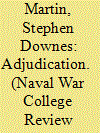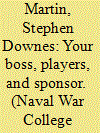|
|
|
Sort Order |
|
|
|
Items / Page
|
|
|
|
|
|
|
| Srl | Item |
| 1 |
ID:
133382


|
|
|
|
|
| Publication |
2014.
|
| Summary/Abstract |
Commonly used war-game adjudication methods break down and create unreliable results when addressing novel operational or strategic problems for which we have little experience or data (for example, information warfare or a regional nuclear conflict) and when we wish to explore situations rather than educate officers about well-understood situations. The primary causes of this breakdown are, first, the incorrect assumption that adjudicators are impartial controllers instead of dominant players and, second, the design choice to make the players' decisions the game's primary output. Among the many reasons for war gaming (such as research and analysis, training, education, and discovery), this article focuses on "discovery" war games, where the objective is to find out something previously unknown about a novel operational or strategic problem, something that cannot be better discovered by other methods, such as seminars, work groups, modeling and simulation, or operations research.
|
|
|
|
|
|
|
|
|
|
|
|
|
|
|
|
| 2 |
ID:
133076


|
|
|
|
|
| Publication |
2014.
|
| Summary/Abstract |
In national-security war gaming there are three classes of senior stakeholders whom I call "the three witches"-critical to the success of a game but with the power to affect negatively its quality. These comprise, first, the war-game director's superior and chain of command; second, the senior players within each game cell; and third, the sponsor of the game and that officer's chain of command. Each of these three stakeholders frequently attempts to influence the design of the war game, even during play itself. For two reasons, such attempts amount to inappropriate interference. First, these stakeholders are not (usually) expert in war-game research, design, development, or production. Second, it is a conflict of interest for them to influence the game's design; such interference puts the credibility of the results into justifiable doubt. The director, responsible for delivering a quality game, must manage these three stakeholders throughout design, play, analysis, and postevent reporting to ensure that the game meets the sponsor's national-security-related objectives. Failure to do so puts the war-game director at risk of following the three witches to a fate analogous to Macbeth's.
|
|
|
|
|
|
|
|
|
|
|
|
|
|
|
|
|
|
|
|
|